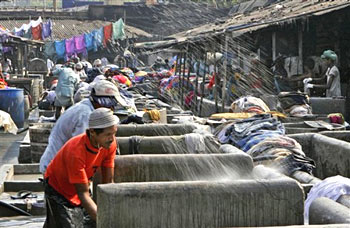 Dhobi is the name of the washerman community. The name, Dhobi, has been derived from the Hindi word `dhona` and the Sanskrit word `dhav`, which literally means to wash. There are several other names for this community. For instance, Warthi is the Maratha name used for the Dhobi caste. Rajak and Parit are synonyms and the latter name being used mostly in the Maratha Districts. The Chakla caste of Chennai is basically leather-workers, but in Chandrapur district of Maharashtra, community is found known as Chakla who are professional washermen.
Dhobi is the name of the washerman community. The name, Dhobi, has been derived from the Hindi word `dhona` and the Sanskrit word `dhav`, which literally means to wash. There are several other names for this community. For instance, Warthi is the Maratha name used for the Dhobi caste. Rajak and Parit are synonyms and the latter name being used mostly in the Maratha Districts. The Chakla caste of Chennai is basically leather-workers, but in Chandrapur district of Maharashtra, community is found known as Chakla who are professional washermen.
In their society, marriage within the same clan and with the first cousins is forbidden. They consider it disgraceful to accept dowry in any form. Their marriage ceremonies are characterised by continuous singing and dancing both at the houses of the bridegroom and the bride. These performances are known as sajnai and birha. Widow re-marriage is allowed. According to their customs, the bridegroom goes to the house of the widow on a dark night completely wrapped up in a black coloured blanket, and he presents the widow some new clothes as well as bangles. Divorce is also allowed with the approval of the headman of the community by the execution of a legal document on stamped paper.
They also follow a number of birth and funeral rites. The principal deity worshipped by Dhobis is Ghatoia, god of the ghat. They have several religious beliefs. Just before starting their work they bow to the stone which they use for washing. They worship this stone during the festival of Dussehra by making offerings of flowers, turmeric and cooked food. Their chief festivals are Holi and Diwali.
They either bury or burn their dead, and they also observe a certain period of mourning for a minimum of three days. They also have a caste committee. The president of this committee is known as Mehtar and the other officials are known as Chaudhari or vice-president. Badkur is one member of the caste who is responsible for appointing dates for the penal feasts and he also issues the summons to the caste members. These posts of the caste committee are hereditary.









